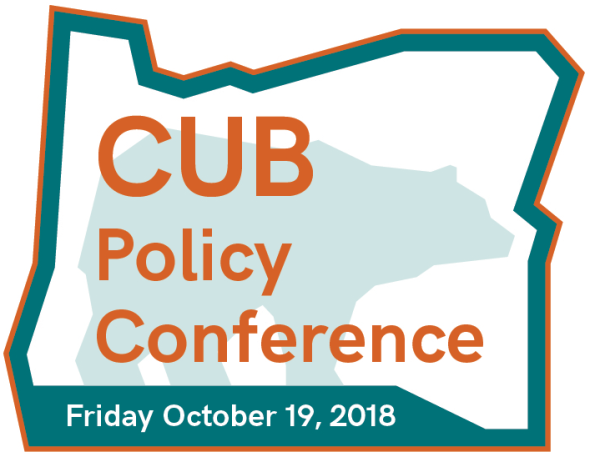CUB Conference Preview: The Connected Utility
Posted on August 21, 2018 by Samuel Pastrick
Tags, Conference & Events

On October 19, at the downtown Portland Hilton, CUB will hold our eighth annual energy policy conference, with the theme Destination: Decarbonization. Consistent with previous years, CUB staffers are previewing each breakout panel on the CUB blog in advance of the conference. For this second feature of six, Outreach Manager, Samuel Pastrick, describes his forthcoming panel: The Connected Utility: Data and Digitalization.
Although the exact inflection point is difficult to identify, roughly 20 years ago the world took a remarkable turn toward digitalization. Today, nearly everything—from commerce and new forms of currency, to social and civic engagement; media and entertainment; education and health care; hospitality and transportation—is now reliably accessible through a multitude of online, digital, and mobile-ready formats—at least for those not facing economic, cultural, or other barriers.
It is increasingly the rule and not the exception for both private businesses and public entities to engage with their customers and constituents not in person, or even over the phone, but rather via a connected world of Internet-enabled devices, software applications, and network infrastructure. While an exact definition for this combined and connected world is somewhat elusive, the widely accepted phrasing is information and communications technologies (ICTs).
The above list of digitally affected sectors is of course not fully exhaustive. However, one notably lagging industry is energy. Compared to recent business innovators in the transportation and hospitality sectors, energy utilities have been somewhat slower to embrace ICT innovations.
And while large energy utilities have been slower to embrace ICT innovations from outside of their arena, their approach has shifted in recent years. Similar to the digital inflection reached in other industries, energy utilities are rapidly embracing digitalization of how they manage their increasingly diverse assets, operate internally, and engage with their customers externally. Such insights from energy utilities are inarguably overdue. They present both new opportunities and challenges, especially for communities historically excluded from the digital revolution.
Internet access in Oregon depends largely on where one is physically located in the state. Nearly 400,000 Oregonians currently lack access to a wired Internet connection capable of 25 megabits per second download speeds; nearly one quarter of this group lacks any access to a wired Internet connection.
The overwhelming majority of those households lacking any wired Internet access live across five Oregon counties: Baker, Gilliam, Sherman, Wheeler, and Wallowa. While more densely populated urban areas in Portland, Salem, Eugene, or Bend do achieve near universal access to high speed Internet, too many residents encounter stark cultural, economic, or other barriers which limit their effective use of high-speed Internet service.
What this means is that the digital divide heavily implicates the digitalization of the energy sector. For communities already excluded from the digital revolution of the past two decades, the chances of their realizing any true benefit from further ICT innovation within the energy industry are remarkably slim. And energy utilities attempting to improve their bottom line—while at the same time decarbonizing their systems through sweeping digitalization of their asset management, internal business operations, and customer engagement functions—may soon find that doing so holistically is more difficult than anticipated.
To discuss the opportunities and challenges associated with emerging energy industry ICT trends, we have assembled an impressive panel. Confirmed panelists include Hector Dominguez, Open Data Coordinator at the City of Portland’s Smart City PDX program (also a CUB Board Member); Kerstin Rock, Senior Vice President of Operations at LO3 Energy; Oregon Representative Pam Marsh – District 5 (Ashland); and Shawn Irvine, Economic Development Director at the City of Independence. We anticipate adding a fifth panelist from Pacific Power with specific expertise in advanced metering technology.
Registration is now open for the 2018 CUB Policy Conference, and you can find more information about the day’s agenda, travel and lodging, and other details on the conference website. We are grateful to Polar Bear Sponsors, Pacific Power, and Portland General Electric; Grizzly Bear Sponsors Avangrid Renewables, and NW Natural; and Media Sponsor Clearing Up, for their generous support of this event. Sponsor packages are available at a variety of levels; for more information contact Pamela White at .(JavaScript must be enabled to view this email address) or (503)227-1984 x10.
Stay tuned for further updates, and previews of our remaining four breakout topics! You can follow conference news by joining our email list, and on Twitter using the haghtag #CUBCon18.
To keep up with CUB, like us on Facebook and follow us on Twitter!




09/05/22 | 0 Comments | CUB Conference Preview: The Connected Utility